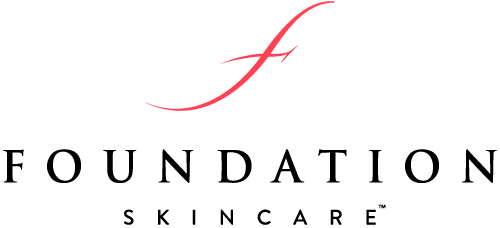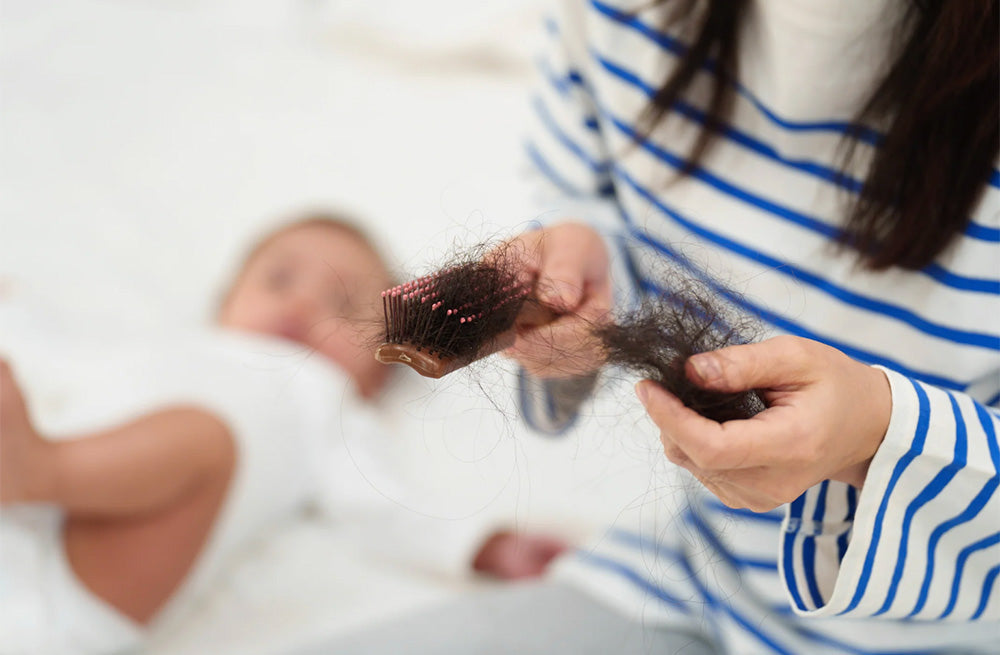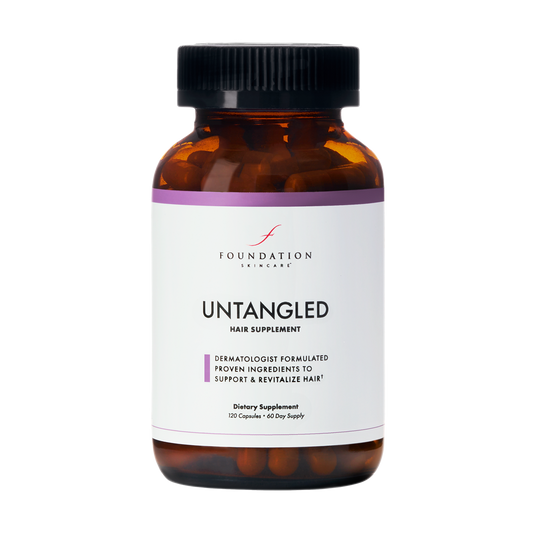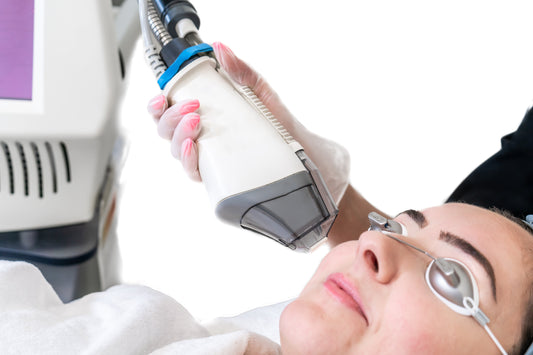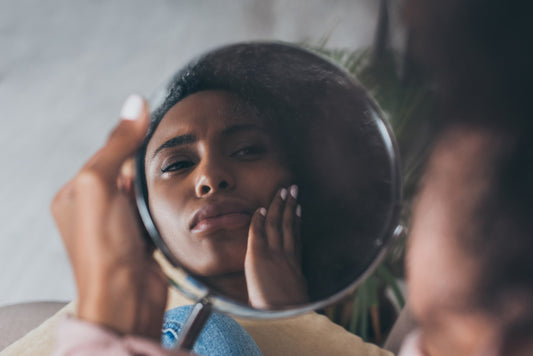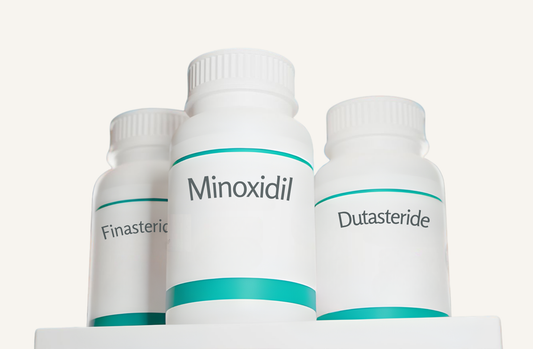The joys of parenthood are plentiful, but hair loss isn’t one of them. Postpartum hair loss affects around 40 to 50 percent of women, but like many changes during pregnancy, this too shall pass.1 Postpartum hair loss is a temporary condition caused by hormonal changes that happen during and after pregnancy and there are many other contributing factors that can make matters worse.
Keep reading to find out how pregnancy affects the hair growth cycle, the best postpartum hair loss treatments, and other tips to support hair growth.
Understanding Postpartum Hair Loss: Unveiling the Common Causes
There are many contributing factors to postpartum hair loss, starting with your hormones. According to the Cleveland Clinic, hormonal fluctuations during pregnancy accelerate the hair growth cycle, causing hairs in the anagen phase (growing) to rapidly move into the telogen phase (resting). A few months later, you start to lose your hair.2
Add the stress of sleepless nights and nutritional deficiencies to the mix, and your hair growth cycle is compromised even more. We’ll dig a little deeper into why this happens and what you can do about it.
Hormonal Fluctuations & Postpartum Alopecia
Many women in the postpartum phase notice their hair falling out at alarming rates, but those same women likely noticed their hair was thicker and fuller during their pregnancy. What’s going on?
During pregnancy, elevated estrogen levels temporarily lengthen the growth phase of hair, resulting in thicker and fuller locks. But as these hormones drop after childbirth, your hair quickly enters the resting phase and shedding occurs. This condition is called postpartum alopecia and it typically happens around three months after pregnancy.3
Hair loss after childbirth can affect the entire scalp, but studies show it tends to be more noticeable in the anterior region, or along the front hairline.4 This may lead you to see your scalp through your hair or you might find more hair than usual on your clothes, pillows, or drain.
Nutritional Deficiencies
Many women experience nutritional deficiencies during pregnancy due to the steady supply of nutrients given to their growing babies. This is why it’s so important to take a prenatal vitamin.
Similar to a growing baby, your hair also relies on a steady supply of nutrients to grow and remain healthy. Specifically, nutritional deficiencies in iron, folic acid, and zinc may contribute to hair loss and these deficiencies may persist during the breastfeeding phase unless you are eating a balanced diet.5
Stress
Poor sleep, bodily changes, and an onslaught of new responsibilities can take a toll on a new parent’s mental health, leading to higher stress levels–another contributing factor to hair loss.
Stress also causes your hair follicles to enter the resting stage, leading hair to fall out more often.6 This is because stress amps up the secretion of cortisol, a hormone that causes your hair follicle stem cells to become inactive. These stem cells are needed to regenerate new hair.7 Practicing stress management techniques is just as essential as following a healthy diet when it comes to supporting your mental health and your hair health during this new stage of your life.
UnTangled Hair Supplement
• Reduces shedding & thinning
• Strengthens hair follicles
Sale price
$65
Tips for Managing Postpartum Hair Loss
When does postpartum hair loss stop? This varies by individual, but most research shows that your hair should return to its normal fullness within a year.8
There are several steps you can take in the meantime to speed this process along and revitalize your hair health:
Nutrient-Rich Diet
Aim to eat a balanced diet to get your fill of important nutrients, including iron, zinc, and folic acid. Some foods you should add to your diet include:
- Eggs
- Lean meats
- Leafy greens
- Nuts
- Milk and yogurt
- Carrots
- Legumes, especially broad beans and lentils
- Seafood, including salmon, mackerel, and oysters
Supplements
We already mentioned how important a prenatal vitamin is during pregnancy, but some supplements that can help in the postpartum phase include those containing:
- Vitamin D
- Biotin
- Zinc
- Folic acid
- Vitamin C
- Vitamin E
- Iron
Foundation Skincare’s Untangled Hair Supplement contains all of the above vitamins in addition to many other nutrients proven to support hair growth and minimize hair loss. These include:
- Marine collagen: Provides the building blocks needed for hair growth
- Horsetail extract: Stimulates hair growth
- Vitamin A: Prevents cell damage
- Selenium: Produces thyroid hormones to regulate hair growth
- Saw palmetto: Blocks DHT, a hormone related to testosterone which is known to shrink follicles; it’s possible this hormone may also fluctuate during and after pregnancy and contribute to hair loss
Please note: If you are pregnant or breastfeeding, it’s important that you consult your doctor before taking UnTangled Hair Supplement or any other supplements.
For the best results, pair UnTangled Hair Supplement with Foundation Skincare’s Hair Serum, a topical treatment that stimulates new hair growth from the root of the follicle to visibly improve fullness, thickness, and overall hair health. The dermatologist-formulated product also contains DHT-fighting saw palmetto alongside other ingredients like Stimucap to prevent further loss, niacin to oxygenate follicles, and apple stem cells, which stimulate dormant hair follicles.
If you order UnTangled Hair Supplement with the Hair Serum in our UnTangled Essentials Kit (which includes two bottles of the serum), you’ll receive a discount and even more savings if you sign up for a subscription.
Gentle Hair Care
During the postpartum period, it’s especially important to be gentle with your hair to minimize breakage and further damage. You can do this by avoiding tight hairstyles, excessive heat styling, and harsh chemicals. Also be sure to opt for a mild shampoo and conditioner suitable for your hair type.
Stress Management
Practicing stress management techniques is important for your mental health whether you’re pregnant, postpartum, or you don’t even plan on having kids. But finding ways to reduce stress can also help mitigate postpartum hair loss.
Some relaxation techniques to consider include deep breathing exercises, meditation, yoga, or gentle exercise. You may even want to consider talking to a therapist if you need more support. The postpartum period is a time of great transition and it’s not uncommon to experience changes in your mental health, but if you are feeling increasingly overwhelmed, depressed, or anxious, it’s important you talk to your doctor right away. It’s also helpful to reach out to your family and friends and take breaks when needed to prioritize self-care.
Professional Advice
If you are not seeing the results you wanted or you think your hair loss may be related to another cause, you may want to consult a board-certified dermatologist for other potential treatment plans for your hair loss.
If you use UnTangled Hair Supplement and the Hair Serum you should start to see new hair growth (which may appear as fuzz-like hair or dark specks) within 30 days. Within 90 days, you may find your new hair is softer, fuller, and visibly shinier. With consistent use, the products will strengthen your hair and make it grow faster. Over time, you can gradually decrease your dosage for maintenance, though it may slow down the growth stage.
Learn more about how these products work together and find more tips on maintaining healthy hair and skin in the FS Journal.
References:
-
https://americanpregnancy.org/healthy-pregnancy/pregnancy-health-wellness/hair-loss-during-pregnancy/
-
https://my.clevelandclinic.org/health/diseases/23297-postpartum-hair-loss
-
https://my.clevelandclinic.org/health/diseases/23297-postpartum-hair-loss
-
https://www.ncbi.nlm.nih.gov/pmc/articles/PMC3884776/
-
https://www.ncbi.nlm.nih.gov/pmc/articles/PMC5315033/
-
https://www.mayoclinic.org/healthy-lifestyle/stress-management/expert-answers/stress-and-hair-loss/faq-20057820
-
https://www.nih.gov/news-events/nih-research-matters/how-stress-causes-hair-loss
-
https://www.aad.org/public/diseases/hair-loss/insider/new-moms
-
https://www.verywellhealth.com/postpartum-hair-loss-7551449
